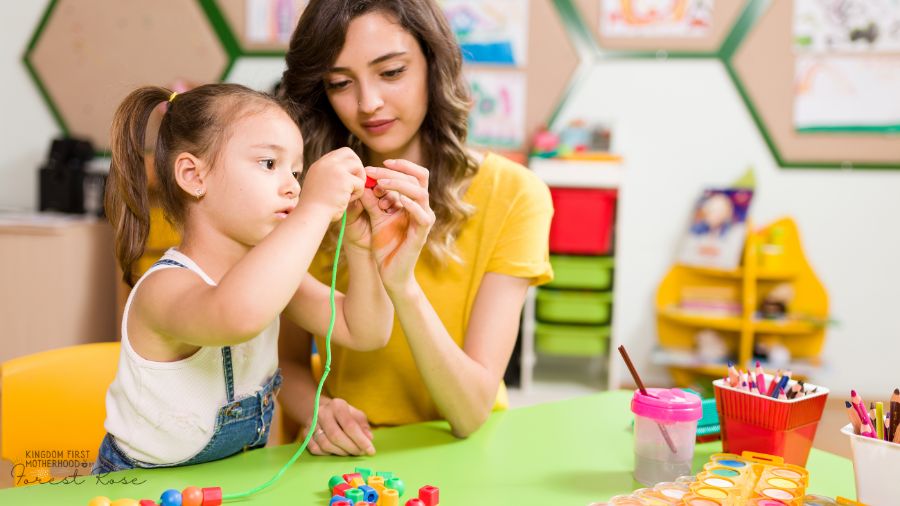Creating a nurturing space during the early years of childhood is one of the most impactful things parents can do. These foundational years are crucial for shaping a child’s cognitive, emotional, and social development. A supportive environment not only fosters a sense of security but also encourages exploration and curiosity. By focusing on creating a positive, engaging space, you are setting your child up for a lifelong love of learning and personal growth.

Here we will explore practical ways you can nurture your child’s development and create an environment where they can thrive.
The Importance of a Nurturing Environment
The early years of a child’s life are a period of rapid growth and development. During this time, children are like sponges, absorbing information from their surroundings and experiences. A nurturing environment is crucial in helping them reach their full potential. It provides the emotional support that fuels their confidence, encourages learning, and helps them navigate new challenges.
Beyond emotional security, a nurturing environment promotes cognitive and physical growth. By offering children a stable space where they feel safe, parents and caregivers can introduce new concepts, games, and ideas that stimulate learning. Whether it’s reading together, engaging in creative activities, or simply offering encouragement, these early interactions shape a child’s lifelong approach to learning.
Lastly, love and support from caregivers provide the foundation for resilience. When children feel secure in their environment, they are more likely to explore and take healthy risks, which leads to further growth and self-discovery.
Key Elements of an Effective Learning Space
Creating a space that promotes learning doesn’t require fancy gadgets or an elaborate setup. It starts with a safe, inviting, and sensory-rich environment that sparks curiosity. For example, bright colors, varied textures, and interactive objects can all make a significant difference in how your child interacts with the world around them.
Introducing books, art supplies, and educational toys helps foster both creativity and cognitive skills. Having a dedicated area for reading, drawing, or imaginative play gives children a sense of routine, which can also enhance focus and independence.
In addition to the home environment, many parents turn to preschool programs to complement their efforts. These programs offer a structured learning space where children can further develop their skills while interacting with peers. Incorporating a preschool program can expand the resources available for your child’s development, providing a balanced and well-rounded approach to early education.
Play as a Tool for Development
Play is often seen as just a way to pass the time, but it is so much more—especially in early childhood. Play is one of the most effective ways for children to develop essential skills such as problem-solving, communication, and emotional regulation. Through play, children learn how to navigate social situations, understand consequences, and even explore their creativity.
There are various types of play that support cognitive and social growth. For example, constructive play (like building with blocks) teaches spatial awareness and critical thinking. Role-playing games, such as pretending to be a doctor or teacher, allow children to practice communication and empathy. These activities not only make learning fun but also strengthen their capacity for both independent and group problem-solving.
At home, encouraging this kind of play is simple. Offer open-ended toys like building blocks, art supplies, or costumes that promote imagination. Allowing your child the freedom to explore without rigid guidelines will help them develop a sense of autonomy and confidence in their abilities.
The Role of Socialization in Early Growth
As much as play is essential for personal development, social interaction plays a huge role in shaping a child’s ability to communicate and collaborate with others. Socialization teaches children how to work in a team, share resources, and develop empathy. Through group activities and peer interaction, kids learn how to manage different perspectives, conflicts, and relationships.
This is where group learning environments, such as those found in preschool programs, come in handy. Preschool offers structured opportunities for children to interact with peers in a safe and guided setting. These social interactions teach them essential life skills, such as cooperation and turn-taking, which are crucial as they grow older.
In addition, preschool settings help children adjust to a more formalized structure of learning. It eases the transition from home to school and prepares them for the more complex social dynamics they’ll encounter in kindergarten and beyond.
Supporting Emotional Growth in Young Children
Emotional development is just as critical as cognitive and physical growth in a child’s early years. Helping children recognize, understand, and manage their emotions equips them with lifelong skills. Creating an emotionally supportive environment means being responsive to your child’s feelings, offering reassurance, and encouraging them to express themselves openly.
Positive reinforcement plays a key role in emotional development. Praising your child for expressing emotions in a healthy way—whether it’s handling frustration or showing kindness—reinforces those behaviors. In addition to what you provide at home, a well-structured preschool program can be invaluable in supporting emotional growth. These programs introduce children to new social situations where they learn to manage their emotions, interact with others, and build resilience in a nurturing setting.
Furthermore, preschool programs often incorporate activities designed to teach emotional intelligence, such as role-playing or group discussions about feelings. This can help children learn how to handle conflicts, deal with separation from parents, and develop a sense of empathy toward their peers.
Conclusion
Providing a nurturing space for your child’s growth, whether at home or through a well-chosen preschool program, is one of the best ways to set them up for success. Encouraging exploration, play, and socialization will foster their emotional, cognitive, and social development. A balanced combination of home-based learning and structured environments can help children thrive during these critical early years.
Consider looking into how preschool programs can support your efforts in nurturing your child’s growth and exploration. A well-rounded approach will help your child build a strong foundation for the future.
For more homeschooling inspiration, tips and encouragement, make sure to follow KFH on Facebook, Pinterest, Instagram and Twitter, and subscribe to our Newsletter for some FREE GOODIES!
Forest Rose is a God Loving, Blessed Wife, & Mama to 3 girls. She’s passionate about lifting moms out of the trenches that are discouraged, overwhelmed, or feeling alone or isolated. Her hope is to point them to Christ and equip them to rise up with a newfound hope and joy within, that He alone can provide. Besides blogging, she also loves to create printables!




Leave a Reply